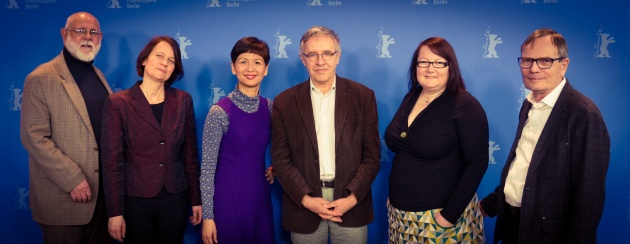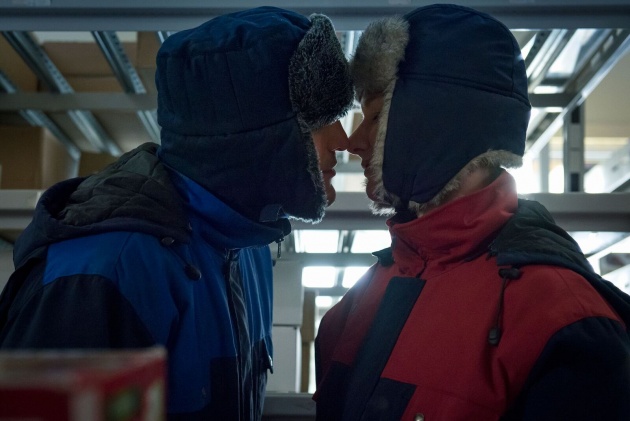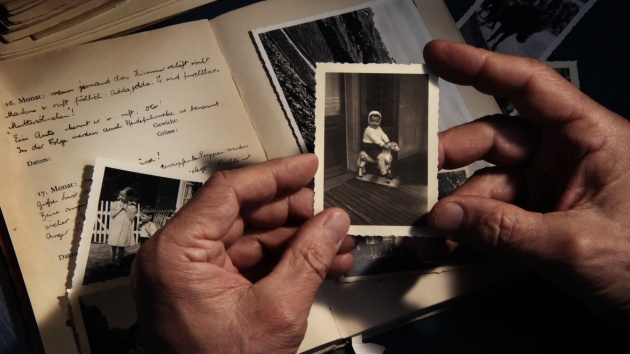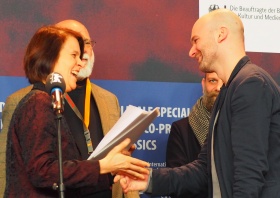Borders and boundaries at the 68th Berlinale

I first served on the Ecumenical Jury at the Internationale Filmfestspiele Berlin in 1995 as the festival was celebrating the 100th anniversary of the cinema. Though the earliest film audiences were fascinated by images of trains entering the station and other simple documentations of movement, film quickly became a way to tell powerful stories through which we reflect on the world around us.
1995 was just six years after the Berlin wall came down and though the borders were open their legacy was evident: a student had me to dinner to see her Soviet era apartment; WC attendants in the former eastern zone still rationed toilet paper; and German jurors wondered what it would cost the west to fully integrate their country. In the intervening 23 years Germany has come a long way, yet the shadow of the wall and all it represented is still visible. Near the Berlinale Palast a few remaining panels of the wall and a line in the cobble stones remind us of the divided past. This legacy of a divided Germany can also be seen on the screen. The Panorama documentary Familienleben (Family Life) by Rosa Hannah Ziegler (Germany 2018), with its far from idyllic picture of family and rural life, and In den Gängen (In the Aisles) by Thomas Stuber (Germany 2018), which won the main competition prize of Ecumenical Jury, are both set in a contemporary eastern Germany that has not quite caught up with the west. In den Gängen portrays the community that workers make for themselves as they nightly restock a “big box” store. In one poignant scene a forklift driver longs for the life as a long distance semi-truck driver which he lost with reunification. Ultimately, we will learn of other ways in which his life has not lived up to his hopes.

A wider festival theme was the moral weight of the European resistance to the arrival of African and Middle Eastern refugees. It was the subject of Styx by Wolfgang Fischer (Germany/Austria 2018), which received the jury’s prize for a film in the Panorama. Shot almost completely within the contained space of a sailing yacht, it tells the story of doctor sailing the Atlantic who comes upon a sinking boat loaded with refugees. She seeks to get others, larger vessels and the coast guard to help, and must ultimately decide whether and when to act. Transit by Christian Petzold (Germany/France 2018) tells a WWII era story that recalls Casablanca’s tale of European emigrants who cannot escape the war without the proper papers. Never directly mentioning the contemporary crisis, the tale from Europe’s past is shot uncostumed in contemporary Marseille. By dislocating the temporal setting the filmmakers require us to ponder the relationship between those displaced by past and contemporary wars.

Documentaries also recorded the experience of refugees and questioned their treatment. Zentralflughafen THF by Karim Aïnou (Germany/France/Brasil 2018) records a year in the life of refugees housed at Berlin’s long closed Tempelhof airport while they await decisions about their status. Swiss director Markus Imhoof’s Eldorado (Switzerland/Germany 2018) draws on personal memories to connect the experience of contemporary emigrants to that of Europeans in WWII. On the surface the film is a conventional documentary about African refugees hoping to be part of the tiny handful who will be admitted to Switzerland and the local anxieties they elicit. However, Eldorado is interrupted by photos and Imhoof’s own voiceover recollection of an Italian child his Swiss family took in during the war who was ultimately sent back to her death. Then and now his country’s refugee policies haunt him.

I ponder these films about borders and refugees as an American painfully aware of my own president’s desire to build a wall against refugees. It’s worth considering the American films screened at the Berlinale in light of these films. The festival opened with Isle of Dogs by Wes Anderson (Great Britain/Germany 2018), a stop action animation film set in a fictional Japan. Stylistically informed by both Japan’s own rich history of stop action films and the sagas of Akira Kurosawa the film deals with a repressive government’s treatment of a minority, here dogs. The not entirely successful Damsel by David and Nathan Zellner (USA 2017) turns the genre of the western on its head to tell a tale of feminist empowerment. Gus Van Sant’s bio pic Don’t Worry, He Won’t Get Far on Foot (USA 2018) tells of the life of quadriplegic cartoonist John Callahan. Each film deals with disempowered outsiders but addresses them through tales of individual triumph.

Taken as a whole the films I saw at the Berlinale point to film’s power to both delight and challenge us. They are not mere escapes but create worlds which raise profound questions about the way the world we inhabit is organized. The lives of emigrants, so thoughtfully explored at this year’s Berlinale, are best served by movies with a broader social and moral vision that resist the temptation to imagine that societal problems can be solved through individual triumph.

